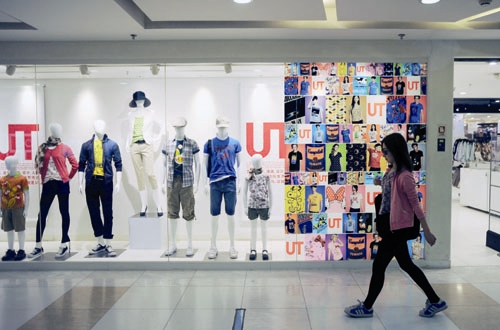
Different models
Zara and H&M, together with US retailer Gap Inc and Japanese brand Uniqlo, are often categorized as "fast-fashion" clothing because they sell on a weekly to monthly turnover affordable versions of new styles.
Apparently, brick-and-mortar stores alone are not enough to satisfy the demand of the massive young population that lives in third- and fourth-tier cities who long for international labels just as much as do their peers in Beijing and Shanghai.
|
 |
|
A uniqlo store in Beijing. The on-line store of the Japanese fast-fashion brand charges 7 to 15 yuan ($2) per order, depending on different geographical areas. [Photo/China Daily] |
As a result, foreign apparel has either gained ground in, or has had the potential, to exploit China's e-business over the past two years. However, each company has chosen different approaches.
Zara said it has hired a group of experts that monitors the global logistics system to ensure any order from China will be handled directly from its Spanish headquarters.
Unlike Zara, which operates the website entirely on its own, Uniqlo chose to outsource part of the business to third-party vendors.
Upon payment, for example, users are redirected to a tailor-made page by Alibaba Group's most popular online marketplace, where transactions and delivery are fulfilled through the Taobao channel.
Gap, in contrast, deployed a hybrid model. owning a self-run website and at the same time operating on Tmall.com, the business-to-consumer branch of Alibaba.
At the same time, H&M runs a Chinese-language website but only displays merchandise without supporting online purchases.
The concept of a Chinese online business is not the same as setting up an operation in China, said Burghardt Groeber, vice-president of Hybris AG's Asia-Pacific branch in Hong Kong, a provider of multichannel commerce software.
"Sometimes certain vendors have large volumes of shipments and revenues generated from the Chinese market on a daily basis but they don't even have a Chinese operation," Groeber said.
As foreign vendors try to drum up interest from Chinese customers they have to joust with local e-commerce rivals.
For foreign fast-fashion brands it is a big challenge to effectively replicate the success they had in the brick-and-mortar world where they outplayed traditional fashion retailers with smaller volumes and seasonal collections, said Vladimir Djurovic, president of Labbrand Enterprise Management Consulting in Shanghai.
"What foreign fast fashion brands are facing is the risk that local early specialists, such as Vancl and M18.com, could outplay them," he said.
For instance, Vancl is the largest business-to-consumer direct apparel retailer in China, with its own designers, manufacturing, alliances and largely self-owned logistics system.
According to Djurovic, they are entering a new competitive environment and need to build new skills just to be able to compete, such as logistics expertise, online shopping experience and online communications acumen.